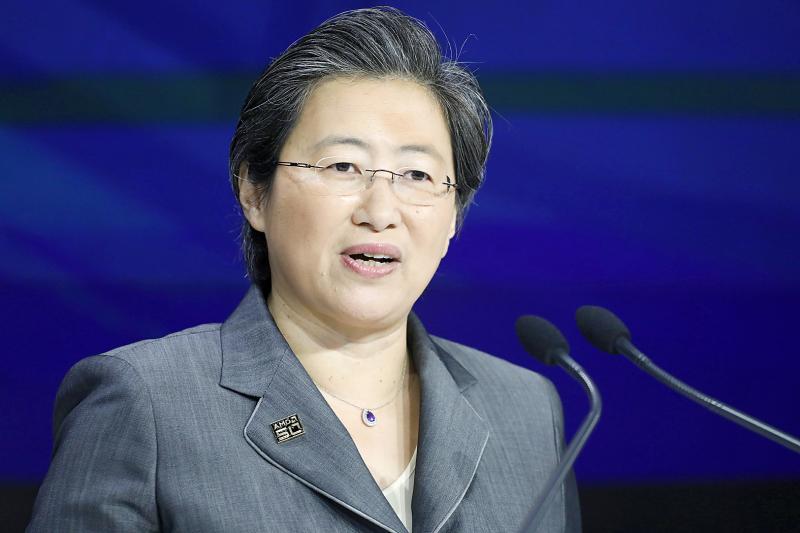Lisa Su (蘇姿丰), the Taiwan-born president and chief executive officer of US-based chipmaker Advanced Micro Devices Inc (AMD), is to receive the prestigious Robert N. Noyce Award, honoring her contribution to the semiconductor industry.
Su is to receive the award at the Semiconductor Industry Association (SIA) Leadership Forum and Award Celebration, a virtual event scheduled for Nov. 19, the association said in a statement.
Su would be the second ethnic Chinese awardee after Taiwan Semiconductor Manufacturing Co (台積電) founder Morris Chang (張忠謀), who was given the award in 2008.

Photo: AP
“A tremendous leader in our industry, Lisa Su has successfully advanced leading-edge semiconductor and high-performance computing technologies throughout her career as an accomplished business executive and engineer,” SIA president and chief executive John Neuffer said in the statement.
“Lisa’s outstanding achievements have significantly strengthened the semiconductor industry and America’s global technology leadership, and she has inspired and opened doors for countless others in tech along the way,” Neuffer said.
Su was born in Tainan to Su Chun-hwai (蘇春槐) and Sandy Lo (羅淑雅) in 1969, and emigrated to the US at the age of 3.
From 1986 to 1994, she completed her post-secondary education — bachelor’s degree through doctorate — in electrical engineering at the Massachusetts Institute of Technology, and then began her career at Texas Instruments Inc, followed by International Business Machines Corp.
Su in 2012 joined AMD as a senior vice president, and since October 2014 has been the company’s president and chief executive.
During Su’s tenure, AMD has become a leader in high-performance computing and graphics technologies for PCs, data centers and gaming, the association said.
Since the Robert N. Noyce Award was created to honor the memory of Intel Corp cofounder Robert Noyce, it has been used to recognize individuals for outstanding achievement and leadership in support of the semiconductor industry.

To many, Tatu City on the outskirts of Nairobi looks like a success. The first city entirely built by a private company to be operational in east Africa, with about 25,000 people living and working there, it accounts for about two-thirds of all foreign investment in Kenya. Its low-tax status has attracted more than 100 businesses including Heineken, coffee brand Dormans, and the biggest call-center and cold-chain transport firms in the region. However, to some local politicians, Tatu City has looked more like a target for extortion. A parade of governors have demanded land worth millions of dollars in exchange

An Indonesian animated movie is smashing regional box office records and could be set for wider success as it prepares to open beyond the Southeast Asian archipelago’s silver screens. Jumbo — a film based on the adventures of main character, Don, a large orphaned Indonesian boy facing bullying at school — last month became the highest-grossing Southeast Asian animated film, raking in more than US$8 million. Released at the end of March to coincide with the Eid holidays after the Islamic fasting month of Ramadan, the movie has hit 8 million ticket sales, the third-highest in Indonesian cinema history, Film

Taiwan Semiconductor Manufacturing Co’s (TSMC, 台積電) revenue jumped 48 percent last month, underscoring how electronics firms scrambled to acquire essential components before global tariffs took effect. The main chipmaker for Apple Inc and Nvidia Corp reported monthly sales of NT$349.6 billion (US$11.6 billion). That compares with the average analysts’ estimate for a 38 percent rise in second-quarter revenue. US President Donald Trump’s trade war is prompting economists to retool GDP forecasts worldwide, casting doubt over the outlook for everything from iPhone demand to computing and datacenter construction. However, TSMC — a barometer for global tech spending given its central role in the

Alchip Technologies Ltd (世芯), an application-specific integrated circuit (ASIC) designer specializing in server chips, expects revenue to decline this year due to sagging demand for 5-nanometer artificial intelligence (AI) chips from a North America-based major customer, a company executive said yesterday. That would be the first contraction in revenue for Alchip as it has been enjoying strong revenue growth over the past few years, benefiting from cloud-service providers’ moves to reduce dependence on Nvidia Corp’s expensive AI chips by building their own AI accelerator by outsourcing chip design. The 5-nanometer chip was supposed to be a new growth engine as the lifecycle